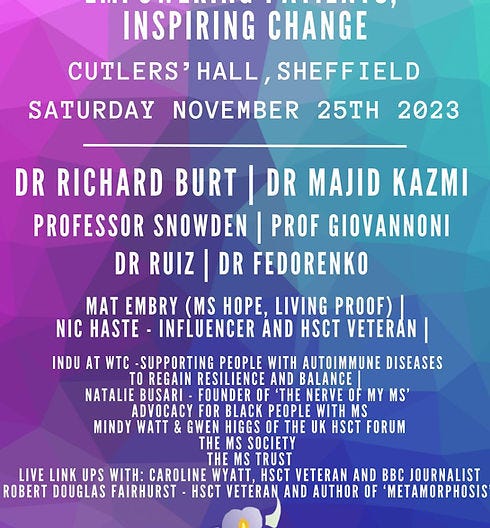Inspiring Change: changing the MS treatment paradigm
AIMS 5th Birthday MS Summit: Empowering Patients, Inspiring Change. Sheffield 25th November 2023.
A few years ago, I learned that when it comes to running a specialist epilepsy service, if you, as a neurology team, are not referring a certain proportion of your patients for surgery, then you are not managing your patients properly. I think the same applies to multiple sclerosis services, i.e. if you are not treating a proportion of your patients with alemtuzumab and/or referring them for AHSCT (autologous haematopoietic stem cell transplant), then you are not managing your patients correctly.
Despite taking this position, a large number of neurologists disagree with me and don’t use alemtuzumab, nor do they refer patients for AHSCT. The main reason for this is they consider these treatments too risky and feel they can manage MS with safer monoclonal antibody therapies, i.e. the anti-CD20 therapies and natalizumab.
The NEIDA (no evident inflammatory disease activity) target dictates the worldview of these neurologists and not the end-organ damage target. Yes, the anti-CD20s (rituximab, ocrelizumab, ofatumumab and ublituximab) are natalizumab very good at rendering pwMS free of relapse and focal MRI activity, but they are not that good at targeting smouldering MS and ‘normalising’ brain volume loss. In comparison, when used early, both alemtuzumab and AHSCT have a profound impact on brain volume loss. Who wouldn’t want to protect their brain from ongoing albeit slower brain damage? Then, there is the question of a potential cure. Yes, I am convinced that a small proportion of pwMS treated early with an IRT (immune reconstitution therapy), be it cladribine, alemtuzumab or AHSCT, are cured of having MS. If this is shown to be the case, why wouldn’t we adopt IRTs as a first-line option top treat MS?

As an MS expert, the most exciting data to be published in the last five years comes from another disease area, i.e. the CD19-targeted CAR T-cell results in patients with refractory systemic lupus erythematosus. For my analysis on this, please see my previous MS-Selfie Newsletter, ‘CAR T-cells as a treatment for MS’ (17-Sept-2022). The good news is that we have been working behind the scenes, and we can now say that at least one phase 1b safety study of CD19-targeted CAR T-cells will be starting in MS, with several other companies exploring potential trials as well. I wonder what the alemtuzumab and AHSCT laggards will say about this? I suspect they will think CAR T-cells are too risky as well. The question I ask ‘too risky for whom’?
Please read Refuseniks (6-May-2021) and Refusniks-2 (4th-Mar-2022) for a more detailed perspective on risk.
I have been invited to give the ‘37th McEWAN-JONES VISITING PROFESSOR LECTURE’ in Toronto in early December. I am going to focus my discussion on what MS care will look like in 2050, which I predict will prevent at least a proportion of the next generation of people from developing MS. For those who have MS, we will be offering some of a potential cure. I can’t stress how exciting CAR T-cells and other emerging therapies are for the field of MS. Saying this, Professor John Newsom-Davis, one of my mentors, said that a bird in hand is worth two in the bush. We have cladribine, alemtuzumab and AHSCT at our disposal; we, therefore, should be making greater use of these treatments now. This is why we need to get the tier system of DMTs and the restrictions lifted on using these treatments first-line. I plan to make this point when I speak at the ‘AIMS MS Summit: Empowering Patients, Inspiring Change’ in Sheffield on November 25th. The programme looks excellent, with many proponents of AHSCT in MS at the meeting. The only downside is that there are far too few female speakers on the programme ( 🥺 #FatherOfDaughters). Tickets are still available if you want to attend.
Main Programme (click here to download the programme)
9:30-10:00 - Professors John Snowden & Basil Sharrack - the STAR-MS trial
10:10-11:10 - Key Note Speaker Dr Richard Burt - RRMS and Progressive MS.
11:30-12:00 - Dr Majid Kazmi - HSCT for MS in the UK and the power of patient advocacy; a 15-year perspective.
12:10-12:40 - Professor Gavin Giovannoni: Treating MS beyond no evident inflammatory activity (NEIDA): why AHSCT should be an option available to people with MS.
13:10-14:00 - Dr Denis A Fedorenko - The Modern Concept of Hematopoietic Stem Cell Transplantation for Multiple Sclerosis.
14:10-14:25 Dr Elisa Roldan Galvan - CAR-T Therapy.
14:35-15:05 Professor Guillermo J.Ruiz-Argüelles - HSCT for multiple sclerosis. Clinica Ruiz experience.
Breakout Sessions
15:15-15:45 Hall Mathew Embry - Challenging MS Myths in Mainstream Media.
15:15-15:45 Natalie Busari -The Underrepresented: How to make MS Research and Clinical Trials more inclusive for the black community.
15:15-15:45 Indu Khurana - The Lion, The Witch and the Wardrobe.
15:15-15:45 Ruth MacLeod (MS Society) - HSCT and the MS Society & Claire Winchester (MS Trust) - HSCT and the MS Trust
16:00-16:30 Robert Douglas-Fairhurst, Caroline Wyatt & Nicola Chapman Haste - Personal ExperienceS of HSCT.
16:00-16:30 Noëlle Tassy (EBMT Patient Advocacy Committee member) - Autologous HSCT in multiple sclerosis: patients' perspective before, during and after treatment
16:00-16:30 Dominic Shadbolt - But MS Won't Kill You...
16:00-16:30 - Alison Coates (AIMS) - Patient Advocacy; Gwen Higgs - Patient Support; Mindy Watt - Patient Support; Simone Bell - The Role of the Carer.
Billion-dollar question
The billion-dollar question is why has the MS Community not adopted IRTs as the dominant treatment strategy for managing MS? I would like to know if any of you had a discussion about IRTs with your neurologist when you started DMTs and if you were told how they work.
If you are new to the world of multiple sclerosis and the concept of an IRTs, I suggest you read my MS-Selfie Newsletter ‘How do I want my MS to be treated?’ (8th-Oct-2021).
Subscriptions and donations
MS-Selfie newsletters and access to the MS-Selfie microsite are free. In comparison, weekly off-topic Q&A sessions are restricted to paying subscribers. Subscriptions are being used to run and maintain the MS Selfie microsite, as I don’t have time to do it myself. If people want to ask questions unrelated to the Newsletters or Podcasts, you must be a paying subscriber. If you can’t afford to become a paying subscriber, please email a request for a complimentary subscription (ms-selfie@giovannoni.net).
Important Links
X (Twitter) / LinkedIn / Medium
General Disclaimer
Please note that the opinions expressed here are those of Professor Giovannoni and do not necessarily reflect the positions of Queen Mary University of London or Barts Health NHS Trust. The advice is intended as general and should not be interpreted as personal clinical advice. If you have problems, please tell your healthcare professional, who will be able to help you.



Daughter diagnosed in 2019 with RRMS, aged 15.
IRTs were not discussed and we had no knowledge of them although we were convinced the ‘hit it hard early’ was the way to go.
Mum had MS and we were too familiar with the consequences of being under treated.
She started on Dimethyl Fumarate but did move on to Ocralizumab after 12 months.
Our research led us to believe HSCT would bring her the best long term outcome. Her paediatric neurologist was supportive of our opinion but aside from considering other criteria age was a factor.
A few months after turning 18 she was approved for treatment under Dr Kazmi. Unfortunately not NHS funded due to no new lesions on MRI but other factors pointed towards a less favourable long term outlook (heavy lesion load/age at diagnosis/lesion location).
She is now almost 3 months post transplant and doing well.
She’ll be involved in a Q&A session along with 3 others discussing their experience of HSCT at the AIMS Summit at the end of the month.
Being just 19 she is keen to share her perspective on her experience in the hope that others young people in similar situations become aware of their options. (Not named on the programme as only recently been confirmed)
The more I read your newsletter, the more I realize my fear and lack of knowledge has not served me well. I like to think of myself as smart, but MS has pushed me to a level of denial that I am astonished at. Denial and some early trauma related experiences that have contributed to my "toughing" it out on my own, not believing I deserved to receive help etc. I am now looking at Cladribine - 61 years old with increasing progression in the last 4 years, - if this can help me stabilize into the future, I think it is time to advocate for myself and begin a treatment, better later than never. It is so hard for me to contact my neurologist to ask for this potential, which is bananas, but there ya go. A giant, heartfelt thank-you for all you do.